INTERVIEW. Jauhen Afnahel: The Life Must Be Breathtaking
10- 14.02.2018, 9:08
- 48,946
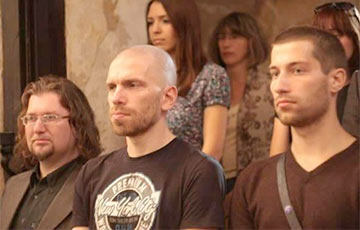
The story of the sea king from modern Belarus.
The name of Jauhen Afnahel, one of the leaders of the Belarusian National Congress and coordinator of the European Belarus, has been known since the early 2000s.
His acquaintances and strangers characterized him as follows: "he is as reliable as a Swiss bank", "dumb dog and conspirator", "he and his team is an explosive mixture".
Journalist of Charter97.org had a chance to meet with an opposition politician in Warsaw and talk to him about his way to resistance and his vision of the future:
- What was the first step? How did you get to your first rally?
-It was one of the first opposition demonstrations in the recent history of Belarus – the action on Dzyady of 1989. It began at the Maskouski cemetery in Minsk and ended not far from Kurapaty. I was 9 years old. My father took me with him.
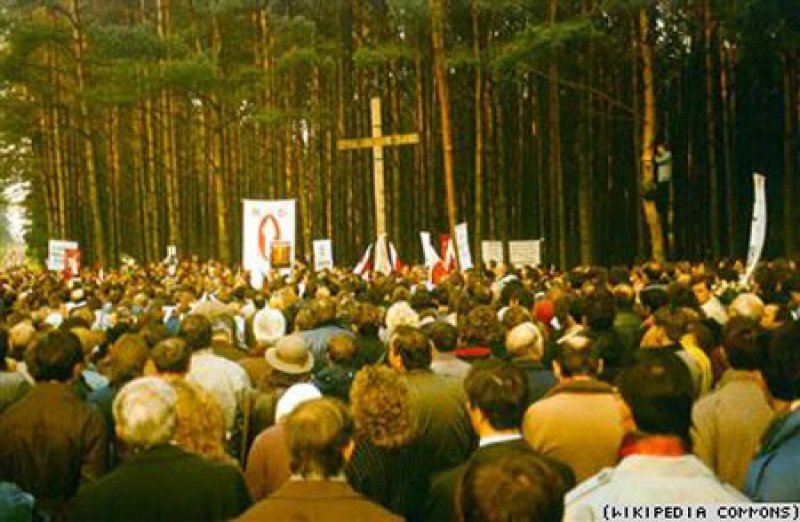
There were some bright moments. Father bought a small white-red-white flag for one ruble, gave it to me and said: this is the real flag of your country. I knew that official symbols differed, I constantly saw red banners on the streets and on TV. Then I did not understand that I held in hands the future state symbol, but I felt the sense of gravitas and some subtext of that act. Otherwise I probably did not remember it. In addition, I have seen dozens of people with the same flag. And I felt like a part of them.
I remember a long column, which I understand now, was walking along the Kalinovskogo Street. For some reason, I wanted to be in the head of the column. We took a trolley bus and drove a couple of stops. I remember how I held the flag and saw people staring at us. But this flag was eye-catching. after all, there were a lot of people with this flag on the street.
- How much impact did your family have on you?
- I was constantly told about the true history of Belarus. I knew about the Grand Duchy of Lithuania, and about the Belarusian People's Republic. Parents stressed that we were not Soviet people, but an independent nation with a long, heroic and extremely interesting history, that we differed from other nations. In addition, they used to work at publishing house "Belarusian Soviet Encyclopedia". They spoke Belarusian language and they spoke it at home.
father used to listen to western radio stations - "Voice of America", "Radio Svaboda". Some topics were discussed in the family, it became a habit after bloody events in Vilnius, Baku, Tbilisi in the late 80s.
In addition, since childhood I have known that my maternal ancestors were dispossessed, and some of them were exiled to Siberia. My paternal grand grandfather, Uladzimir Ivanavich Afnahel, was the member of the Cadets Party and was shot dead by bolshevicks in 1918.
It all had a great influence on me. I can't specify the moment when I realized that I was a Belarusian patriot, a nationalist. It took much time for me to understand it.
- What about your school?? Teachers? - Were you thankful for your world view?
- Yes, of course. My teachers at school, especially teachers of history and literature, played a great role. However, the influence of my family , memories of my ancestors were determining.
By the way, now my parents say jokingly that the participation in the resistance movement is part of our DNA. One of my grandfathers, Jauhen Uladzimiravich Afnahel, I was named after him, took an active part in activities of the Minsk underground during the Second World War, in 1942 he founded an underground printing house in the Trinity Hill; he published and distributed newspapers and leaflets. My another grandfather, Vasil Ivanavich Kurach, was in a guerrilla regiment, which succeeded on the territory of Byarezinsky and Klicheu districts.
- What was the first serious book you read in Belarusian?
- "Brief Overview of History of Belarus" by Vatslau Lastouski. It was a thin book with a white-red-white flag and coat of Arms "Pahonia" on the cover. It was published in the very end of the 80s.
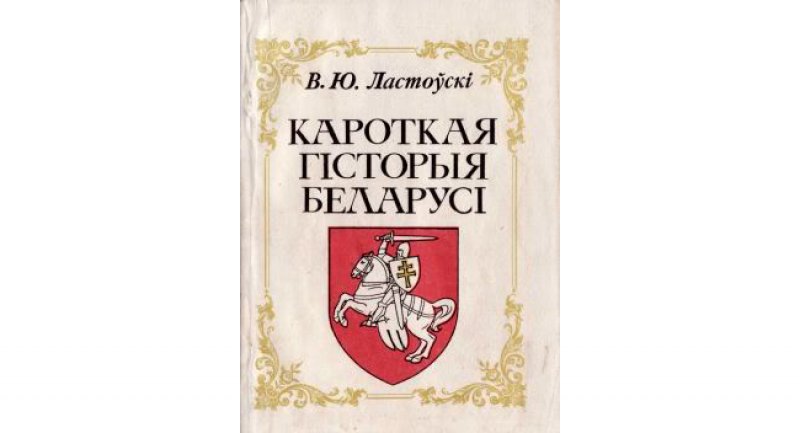
By the way, some true facts of the history of Belarus were available during the Soviet times. When I was a child, while I was reading the "Belarusian Soviet Encyclopedia" published in late 70s-early 80s, I came across an article about coat of arms "Pahonia". However, it was told that it had been used by "bourgeois nationalists".
- That was the reason to enter the Faculty of History at Belarusian State Pedagogical University?
At the end of the secondary school I studied at ordinary school No. 35 on Azizava Street, Minsk. And then one of schools turned into a gymnasium with pedagogical focus. My parents decided it would be better for me to finish the secondary school there.
I could not boast of a desire to become teacher or lecturer. But it was the time of the 1990s. Belarus became independent. The knowledge that had recently been banned - "exclusive" one - were distributed in the society. I'd like to be involved somehow. It became my bee in the bonnet. That was decisive for me to enter the Faculty of History.
-What was the atmosphere at the Faculty?
- It was great. Our teachers, dean and deputy dean were great. Many of them wore white-red-white badges. I'd like to ppint out proffessor of archaeology Lyavon Kalyadzinski.
After all, it happened after the "referendum" of 1996, which changed state symbols. The third part of things were in Belarusian. Independent press was free to dissemination. There was underground literature which caught the second breath. There was the spirit of freedom and mutual assistance at the university. Nobody could imagine that Lukashenka would stay for long.
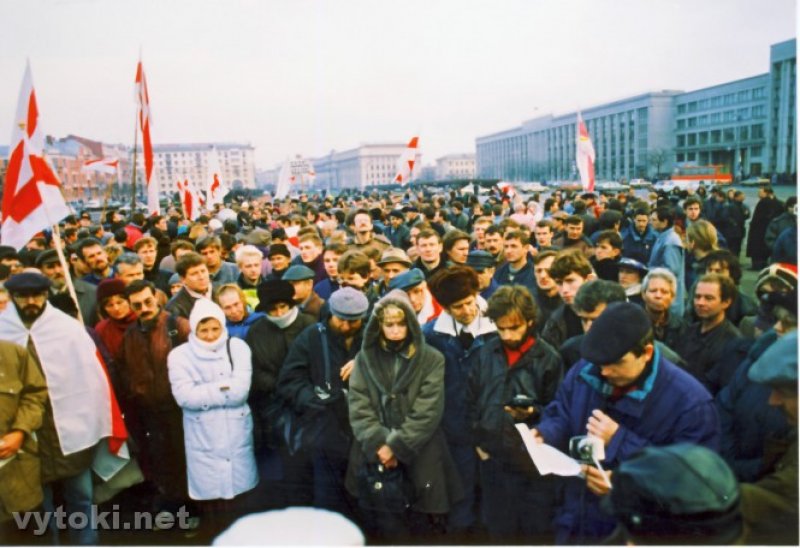
The majority of students were against Lukashenka. Opposition rallies were held under our windows on Independence Square. There were infinite rallies in the autumn of 1996.
I remember many students at those rallies. We took part in them both during or after classes. It was done openly. We were convinced that Lukashenka would not stay for long.
- Was the Young Front your first organization? How and why did you join it?
- Before it I was the member of Little Octobrists (laughs).
I joined the Young Front in the autumn of 1996. Belarusian music and Vital Supranovich promoted it. I had been listening to Belarusian rock bands "Mroja", "Bonda", "Krama", "Uliss" since the early 90s. Vital Supranovich was one of the most famous distributors of the Belarusian music in Minsk. I used to often buy cassets. In one of theautumn days of 1996 he invited me to a cool party. We went to the office of the Belarusian People's Front.
By the way, it was my second time there. When I took my last year at high school I wrote an abstract on "BPF and national and cultural revival of Belarus", and I visited the Office to get some literature.
And then I visited it with Supranovich. It was Thursday. There were 100 people there, Pavel Sevyarynets was taking the floor. And I decided to become a part of it.
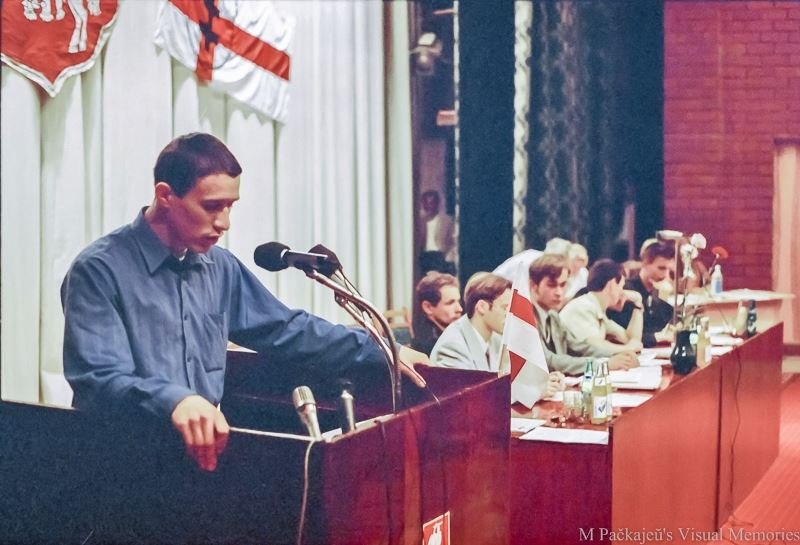
By that time, I had already lived in the Maskouski district of Minsk, because I worked in the Koidanava Rada of the Young Front (KRYF).
- How did you manage to head the KRYF.
- Those were fair elections (laughs).
- It happened in a year and a half when the head of the KRYF Dzmitry Kalubovich had to leave the country because of his political views.
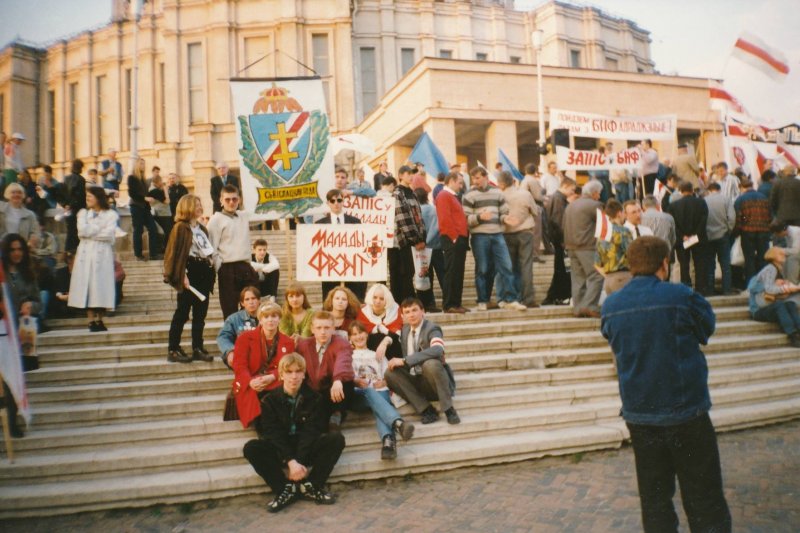
- What does the "KRYF wall" mean? it was veiled with secrets...
- Perhaps, it was caused by our very first leaflet urging people to join the Young Front.
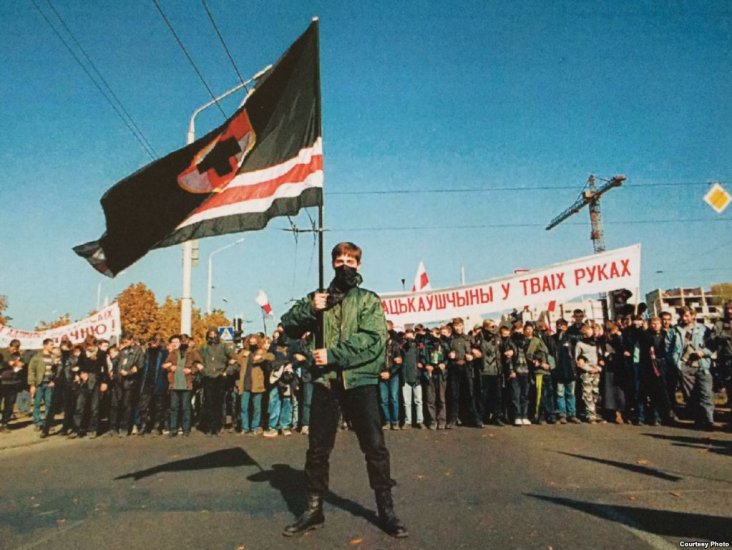
We had a special place for meetings and we met every week. First, we resided in the attic quite in front of the Police Department of the Maskouski District. Then we moved to a small wooden house in the intersection of Zheleznodorozhnaya and Shchorsa Streets.
Every week we met and planned events. The leaflet indicated the gathering place for new people who wanted to join us. The leaflet said: "We are waiting on you at the Shchorsa bus stop near a white wall.
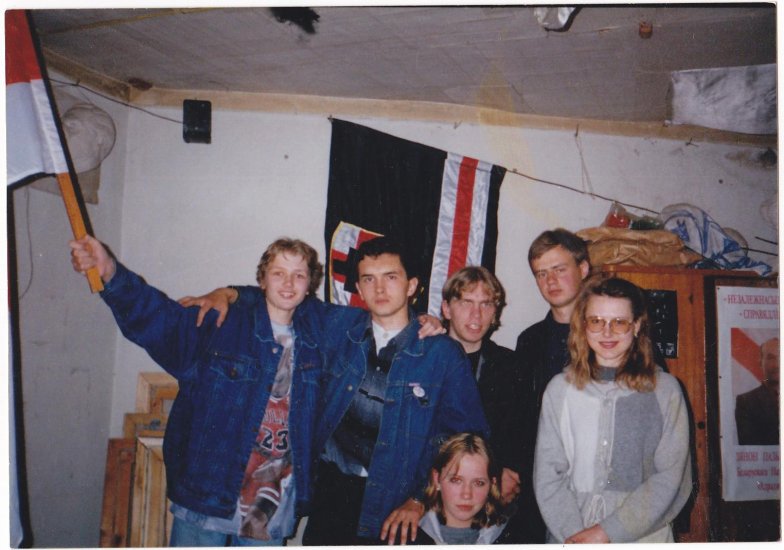
Now it may look ridiculous, but there were no cell phones then, or even pagers. There was an indicator for a place of gathering.
- Why did your whole team join the Zubr resistance movement?
- Four years of active resistance passed, starting from spring 1996. There were mass actions, dozens of thousands people in the streets of Minsk, the Marches of Freedom. But the opposition remained disunited, no one had the plan of the actions, or the strategy of victory either.
In September 2000, there was a revolution in Serbia. The next year, Belarus was to hold presidential election.
There were discussions about the extent to which the experience of the legendary Serbian Otpor was applicable in our situation, not only among my friends and allies but in the society as a whole. We believed it was needed to create a broad youth movement which would unite not only the Belarusian-speaking patriots like the Young Front, but all adherents of changes. There was a need to involve broad masses of young people, who had never been in the democratic movement before, into the resistance.
This is how the idea that the Zubr was needed started to appear gradually.
By that time, we had close contacts with the leaders of the Charter'97 civil initiative, Dzmitry Bandarenka in particular, and also with the activists of other opposition organizations.
And on January 14, 2001 about 50 young people, among whom were myself and my friends, gathered together in the Belavezhskaya Pushcha. Then we took the decision that we create the movement of non-violent resistance, the aim of which was to down the dictatorship in Belarus.
Absolutely different people gathered in the Belavezhskaya Pushcha on that day, those who were members of certain organizations, and those who weren't, new people.
Literally in few days, the work started: the "Zubr" graffiti appeared all over the country. The people started asking questions, interested. Then the first press-conference of the Zubr was held, on which the goals of the movement were announced. I can tell for sure that Belarusians then had hope that something could be achieved in 2001.
Zubr appeared everywhere at once. Literally from the very start it was clear that this was a movement of some absolutely new type. There were terrific stickers, graffiti, bright actions, which were absolutely different from everything that was before.
After the performance "Final Diagnosis" the dictatorship ceased to be terrifying. Lukashenka was then perceived as a mad clown. Everyone laughed at him. In the center of Minsk, people were running wearing the dictator's masks, imitating him playing hockey. Literally in several months the movement captured the whole country. There was nothing like this in Belarus before.
- I remember someone saying at one of the Zubr actions, "Afnahel has the biggest team". How did you manage to gather such a team?
- One person cannot create a team. This is the result of common work of the people, united with one idea, one aim. So our team of the Zubr times is everybody's merit. By the moment of creating the movement, we already had Pavel Yukhnevich, Aliaksei Liaukovich, Maxim Abramchuk; in Summer 2001 Hleb Viazouski, Liuba Kuchynskaya and Mikita Sasim joined, a little later - Maxim Viniarski, Nika Lazouskaya, Danila Barysevich. There are many people whom I still cannot name for the sake of their security.
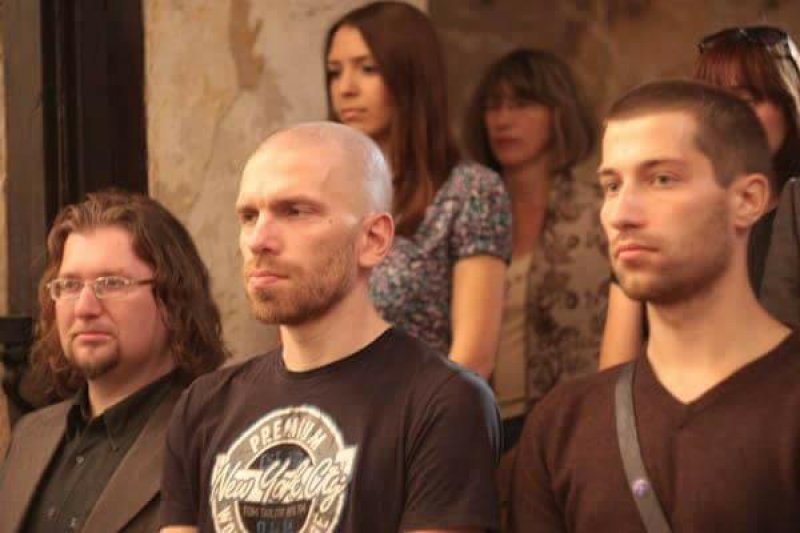
How did it happen that we had so many people? I don't think there's some secret method here. This was a very interesting, dynamic time. We believed in victory, we did what we liked, and were 100% dedicated. In Summer 2001, our team met with several dozen new people every day. Whole neighbourhood companies, classes, student groups joined the Zubr. It was a rare occurrence when a person came to Zubr alone.
- Your team was known not only because of its headcount, but also because of the traditions. For example, you went hiking with serious load around Belarus. What was the aim of these hiking tours?
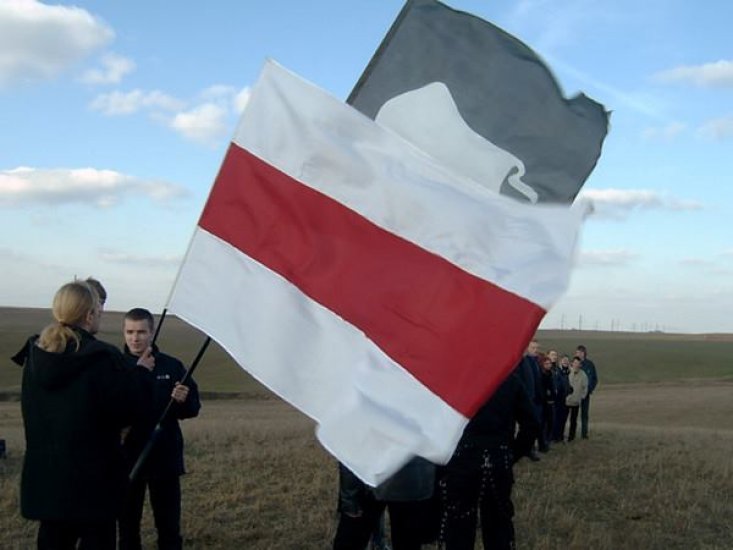
- It was important that the people coming to us not only distributed leaflets, newspapers, glued stickers. We wanted them to constantly learn something new, become a more cohesive team, so that they were interested. For this purpose, not only hikes, but also summer camps, concerts, meetings with famous people were organized.
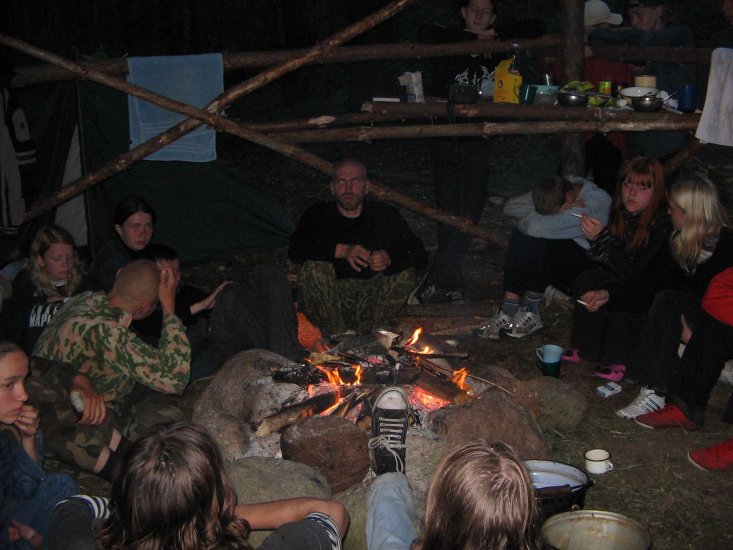
Hiking tours were also for cold training, testing. People returned from them a little different.
The most interesting and memorable was the hike of 2002, which began in Budslau. We passed a big route in two weeks, overcoming 30-40 kilometers a day at full load per day. The path ran through Kryvichy, Narach, Lyntupy, Vidzy, Bahinskaye Lake, along the border with Lithuania and Latvia - to Braslau and Druya.
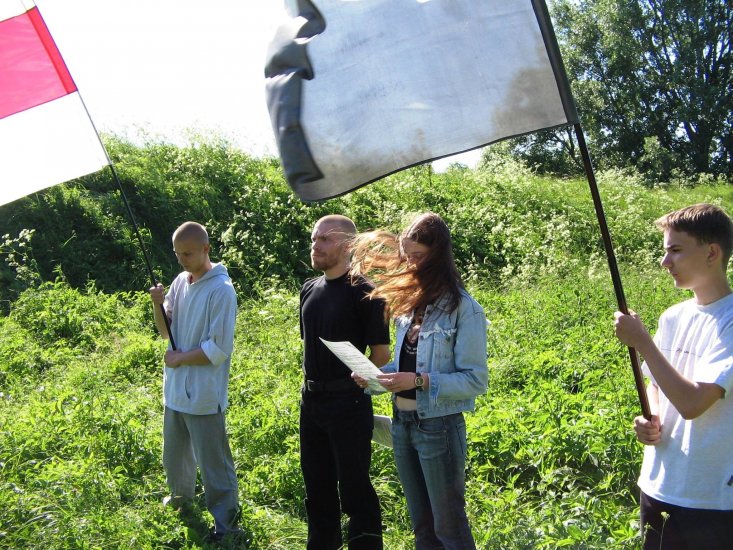
- Clandestine security was also considered the strong side of your team. What is the most memorable, of what you can tell now?
- Clandestine security is no longer secure if someone tells about it. I would better tell about the cases when it was violated. Back then, in 2001, there were practically no cell phones. Pagers were used for operative communication. As a rule, we didn't pass any important information via them, just left a message like "Call me back", or "Need to meet you", and called the conspiracy nickname, which were changed once a week and invented spontaneously.
As we called quite often, they often recognized us in "Vessobel" - the company which served the pagers. Operators often added something personal to the messages, and even the words of support.
- Did you know that activist respectively called you Konung, apart from conspiracy nicknames? Moreover, not only those who were in your team.
- This is such an obsolete story, surrounded with all sorts of legends, that it's time not to recall it. As there were many nicknames, underground and meaningful.
- Do you remember the night of September 9, 2001, when you entered the Trade Unions Palace in the Kastrychnitskaya Square? What did you feel back then?
- I remember the feeling that everything is possible, that we could do anything. It was just fascinating.
In the evening of September 9, about 5 000 people gathered in the Kastrychnitskaya Square, although the "single candidate from the opposition" (Uladzimir Hancharyk - ed.) was weak and cowardly. We took up the building of the Trade Unions Palace without problems, and it became the headquarters of resistance. Someone came up with the idea to hang a white-red-white flag over it. Pavel Yukhnevich rose to the roof and a few minutes later our symbol waved over the Palace.
Then someone suggested playing a football game in the Kastrychnitskaya Square. They split into teams and played football. We congratulated the riot policemen wandering at the entrance on the new president. Everything seemed possible. And it seemed that in the morning we would have a completely different country. Moreover, there was a plan for further action, and everything rested only on the political decision of presidential candidate Hancharyk.
But, unfortunately, in the morning these illusions disappeared for two reasons. First, the observers were afraid and did not want to give a real picture of the results from the polling stations. Secondly, the cowardice of the candidate himself showed up, he simply refused to fight and called for a divergence.
Despite this, the activists of the Zubr stayed in the crowded Trade Unions Palace almost for the whole next day, September 10th; and flags of the movement fluttered over the entrance. And only closer to the evening, when it became finally clear that the single candidate refused to fight, the people left the building.
We went out with flags, passed by the riot policemen, who were in the Kastrychnitskaya Square, and left.
The night from September 9 to September 10 went with the feeling that here it is, the victory - a couple of steps to it. In the morning, it became clear that without our normal presidential candidate, our efforts alone are not enough.
And this was fixed only in 2010. But the authorities by this time also carried out their error analysis session.
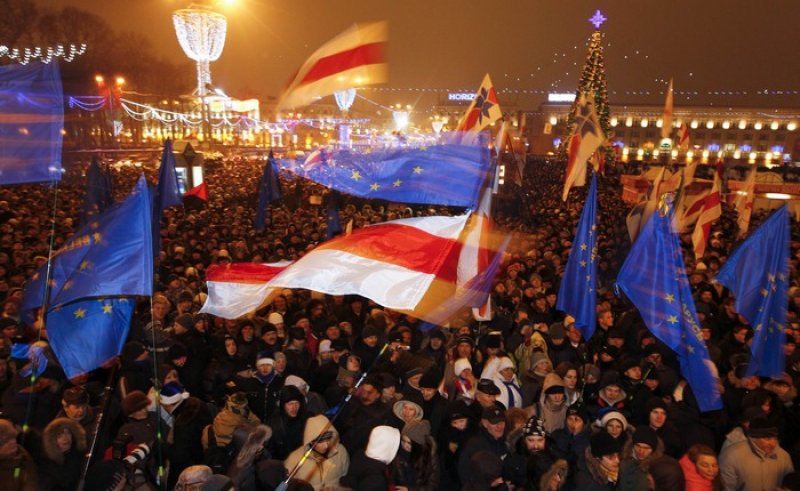
- How was the campaign and the Square-2010 different from the previous ones?
- The years 2001 and 2006 showed that the people who came out to the Square then were much cooler than the presidential candidates. In 2010, there was a different situation, because the presidential candidates - Andrei Sannikov, Mikalai Statkevich, Uladzimir Niakliaeu - spoke about the Square directly. The leaders then did everything possible to make changes closer. Yes, the authorities then used brutal force, brought the army and the police. The Square ended with brutal dispersal. All the independent candidates were detained, many of them got prison terms.
However, we should not blame only the regime for that. We, the millions of citizens of the country, who voted against Lukashenka on December 19, could not defend neither our choice, nor our leaders. The presidential candidates appeared cooler than their adherents this time. Maybe it will sound unpleasant for someone, but the leaders and their families received the hardest blow in 2010. Of course, hundreds of ordinary people were arrested in the Square, but for most of them it all ended with fines and administrative detentions for days. We could not achieve quick release of our leaders though.
- What do you personally remember the most of the election-2010?
- I headed the Minsk electoral HQ of presidential candidate Andrei Sannikov. I coordinated the collection of signatures, and then the agitation campaign in Minsk as well.
So, what I, and probably thousands of Minsk residents remember the most, is the moods of the people in 2010.
This was probably the most fascinating political campaign in the contemporary history of Belarus. We had a wonderful team, awesome people. But the most important is that we had such a powerful support from the people, there were queues to the agitation pickets. The people who stood under the flags of the European Belarus and other independent candidates, simply gathered demonstrations out of those who wanted to put their signatures for the candidates.
Only in Minsk, hundreds of people were involved in the active political life and started coming out to the pickets to campaign for Andrei Sannikov.
Our contact phones simply couldn't cope with such load sometimes. We were physically unable to answer everyone who addressed to us offering help. The meetings with Andrei Sannikov gathered overcrowded halls, when people couldn't get in and listened standing at the entrance.
Such upraise and inspiration left the authorities no choice. That is why their reaction on December 19 is understandable. Lukashenka realized: if the Square is not dispersed with the help of the police and the military today, he will not be there any longer tomorrow.
- In the square, you were in the epicenter of the events - on the pedestal of the Lenin monument. What did you see from there and what did you remember the most?
- The Square didn't come as a surprise to me. The campaign that took place on the eve could not end with anything other than dozens of thousands of people in the Square. It was clear that there would be not just many participants of the action, but very many. It was obvious that if the government does not bristle with troops and the police, it will simply be demolished.
What did I see from the height of the monument? First, a sea of the people which seemed to have no end. The avenue crowded to such an extent that the tail of the column was lost sight of. The festive mood of the people. Excellent self-organization and responsible behavior of the participants of the action. It would seem - complete freedom, the city is ours, but the column was disciplined and there were no incidents during the movement on the avenue.
The Independence Square was also crowded with people. There was a moment when the action had already lasted for an hour, and I noticed that people continued to arrive in crowds to the Square. They approached from the station, from the Sviardlou street, from the Main Post Office - from everywhere.
I only saw something like this in the photographs of the early 90's. It was felt that this is a historical moment, that so many people cannot but achieve what they want.
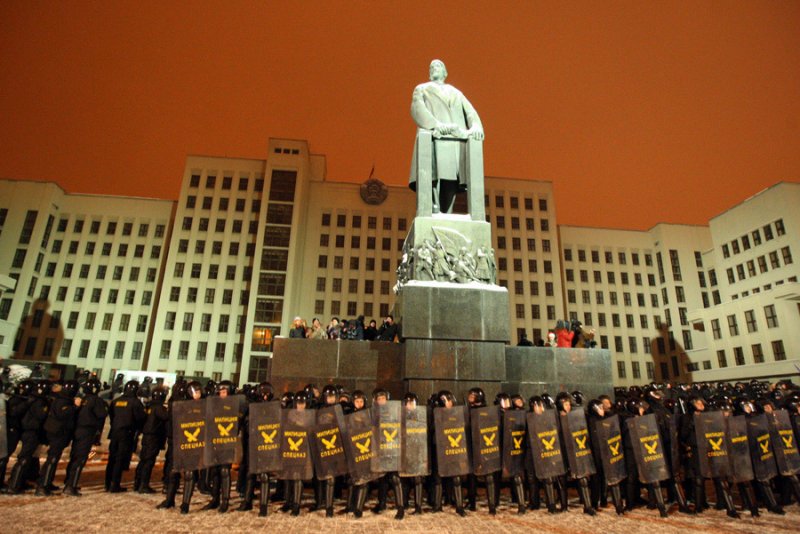
- The Square cost you five years of emigration. But you returned to your homeland and again got actively engaged in the political struggle. Why?
- Because life is boring without all this. Ubergoals and struggling for them, and the adventures connected with such struggle make life real and meaningful.
I remember what Belarusians were like 20 years ago. The people had goals, dreams. Organizations, companies, businesses were created, newspapers and magazines were opened. Life was vivid.
Now, most of those start-ups have been destroyed. Almost everything sound that existed in our society has been cleared up. A huge number of our countrymen live a dull, monotonous, often senseless and feeble life. When I meet some old acquaintances of mine, who are now far from politics, I become sure once again that we are on the right path. As the existence of some of them deserve only pity. It's dull, uninterested and gray.
Real life should not be like this. And to make it decent, one needs to set a goal - not necessarily political - and go to it regardless of all the obstacles. For the last several centuries, they taught Belarusians to survive, discouraging them to commit heroic acts, conquer peaks or just to fight for themselves.
Our life is full of adventures, full of interesting people and unforgettable moments. Yes, they are not always pleasant. But life should be like this - different, with ups and downs. The main thing is that it should bring excitement.
- As one of the BNC leaders, you are now engaged in the preparation of the celebration of the 100th anniversary of the Belarusian People's Republic. How come that almost all democratic forces united around this idea?
- In fact, it's very cool that the responsibility of all leaders of democratic forces prevailed over personal ambitions. For a long time Belarus has been in a state of great threat to its independence.
In neighboring Russia, after the negative experience with Ukraine, they are very carefully watching what is happening here. They assess whether Belarusians are ready to defend their independence. They understand that people who, under the dictatorship, go to the actions, will at the right time defend the country's independence, also with weapons in their hands. I hope, at least, that they understand.
And the March 25 action will be a test for all Belarusians. It should show the real value of independence. If a thousand or two thousand people come out to the action, everyone will understand: at best, as many will defend the country. And this is very few. Therefore, I very much hope that there will be dozens of thousands of people for actions on March 25.
In my opinion, this was the quantity of people who came out on the Freedom Day in 2017. It was evident from how many people gathered in different places around the epicenter of the events. It is very important that this year the Freedom Day should be a mass one and go peacefully. Because this will show the external aggressor the potential for the protection of our country.
I think that the leaders of the democratic forces felt the mood in the society. If this action is failed - people simply will not forgive us. Everyone could sit down at a common table and agree that a mass action on Freedom Day will be held in the center of Minsk and will start in Yakub Kolas Square. And everyone agreed to prepare this action together. Such unity of the democratic forces has not been observed, probably, since December 19, 2010. But then it was forced, and now - voluntary.
- What do you think about the blocking of Charter'97?
- We all know that Charter'97 makes the Belarusian authorities indignant. Charter always covered street protests, asked questions inconvenient for the authorities, showed the example of solidarity with everyone who fought against injustice. Because of this, the website was repeatedly blocked, its journalists were murdered and jailed. Despite all this, Charter'97 survived and remains the most popular and famous Belarusian resource. I am sure it will tough it out again this time.
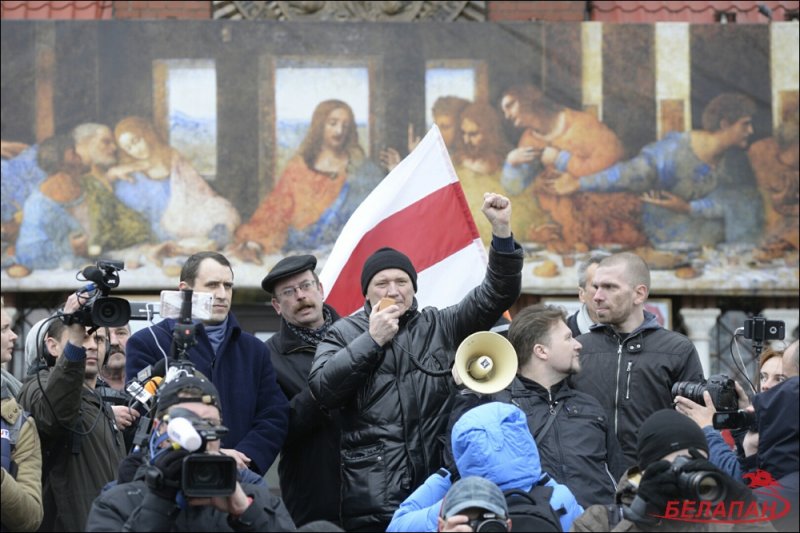
- What would you like to do in the democratic Belarus in future?
- I have been engaged in various activities for my life, I was a teacher, a builder, a journalist, an interpreter, and even a smuggler. Therefore, there's no such question as "what to do?" for me. I will do whatever I want. The most important thing is that me and millions of Belarusians will have the opportunity to live a normal, full life. -
It's not even about Lukashenka and the dictatorship, it's about self-esteem. Once a person begins to respect themselves, their life necessarily changes for the better. Therefore, probably, this is the reason to begin the path to changes for the whole country.









